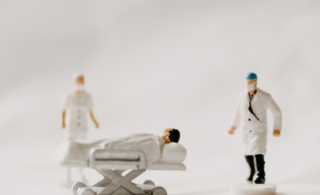
The point at which you receive a breast cancer diagnosis is overwhelming and there is a lot of information to take in, over a short space of time. To help you, we’ve created this checklist of things that you can be thinking about now. We’re talking immediately after your diagnosis, before you’ve started your treatment. You might want to do some of these things straight away, and some of then can be done over the coming days/weeks. We’ve written this from our own experience as people who’ve had breast cancer and been through the treatment.
Click here to see all of our breast cancer checklists to help you get organised. For a downloadable and printable version of this checklist, see here.
- Call the breast care nurse. First up, if the appointment when you were told you had cancer, is a bit of a blur, ask the breast care nurse if you can talk to her about your diagnosis and go through any questions you have. You can run through what your consultant told you at the diagnosis appointment and what the next steps are. For some suggested questions to ask at this stage, see our page Questions to Ask After Diagnosis.
- Check your insurance. We’re talking anything that might kick in after a cancer diagnosis such as health insurance/mortgage insurance/critical illness cover etc. Some of these pay out upon a cancer diagnosis and some insurance policies have dedicated helplines and assistance for people going through cancer.
- Talk to your employer. You don’t have to tell your employer that you have cancer. But you are protected by certain laws when you have been diagnosed with cancer and this means that your employer cannot discriminate against you because you have cancer. In addition, depending on your type of employment and employer, you might be eligible for paid sick leave to attend your appointments. Some employers also have internal policies for dealing with employees who are diagnosed with cancer, including in-house support and extra time off. It’s worth finding out what you’re entitled to, as soon as possible. If your place of employment has an occupational health team then it’s also worth getting a referral to them as they will be able to help you as you go through treatment. Request a referral to occupational health. This is of benefit to you and your employer who may not have had previous experience and will be suitably guided so you in turn can be properly supported. For more information about working with cancer, take a look at our dedicated page on Working with Cancer where you’ll also find links to further resources and information (including information about your legal rights).
- Tell your GP about your diagnosis. And if you’re not registered with a GP, now is the time to get registered. From now on your breast cancer team at the hospital (your surgeon and oncologist) will write to your GP updating them on your diagnosis and treatment (you will receive copies of these letters which are helpful). Further, your GP can provide added support. For example, they can help you manage any other medications that you are taking, they can refer you to places for support and they can refer you to other NHS resources that you may need during your treatment.
- Consider your fertility options. Some breast cancer treatments can cause a temporary or permanent menopause and thus may cause fertility problems. If you are of child-bearing age, please talk to your medical team (surgeon/oncologist/breast care nurse) about your fertility options as soon as possible. For more information, take a look at this Breast Cancer Now page on fertility.
- Consider whether you need a specific support. Are you in a situation where you may need specific support during your diagnosis? For example, if you are pregnant the charity Mummy’s Star can support you. If you are LGBTQIA, the charity Live Through This can support you. If you are in your 20s or 30s, the charities, Trekstock and Shine, can support you. And there is a fabulous support community called Black Women Rising which specifically supports black women with cancer.
- Make a dentist appointment and an appointment to get your eyes checked. When you start your treatment, you might be advised not to visit the dentist, or your treatment might impact your oral health. So, it might be a good idea to just have a dental check-up now, before you jump on the treatment conveyor belt. Also, some treatments can impact your eyes so it’s a good idea to get your eyes tested now and regularly through/after treatment.
- Seeking a second opinion. You will have heard about people getting second opinions after receiving a diagnosis or treatment plan, and you might be wondering if you can do this too. People have different reasons for seeking a second opinion. According to Macmillan, “asking for a second opinion is not a legal right, but most doctors will be happy to refer you.” If this is something that you are considering, check out this page on the Macmillan website or speak to your GP who can advise you.
- Your “point-person”. Consider asking a friend or family member to be your “point person”: someone to accompany you to appointments and take notes at the appointments. You could also ask this person to help you look on the internet for information that you need, if you’re feeling overwhelmed with the internet (remember not to Google, but you can use the internet to find practical advice, support and more information about breast cancer from reliable, trust-worthy sources like CRUK, Macmillan, NHS and Breast Cancer Now.) This person can also help coordinate help from others, for example setting up a school run rota or a meal rota.
- Notebook, pen, diary and folder. There will be a lot to take in from now on, and it is a good idea to write things down because the chances are you won’t remember everything that you’re told. Write down what you’re told at appointments, make a note of any questions you have and the answers you get from medical team. So get a notebook and pen ready. And you’ll need a folder in which to keep all your letters, reports and test results. And a paper diary or calendar can be really useful for all the medical appointments (there will be lots to keep track of).
- Recording your appointments. Some people find it helpful to audio record their appointments so that they can replay the recording afterwards, make notes and take it all in. If you want to do this, you should ask your doctor if you can do this. You can record using your phone, and there are also Apps with this functionality (see point 13 below).
- Put important telephone numbers in your phone. Start putting important contact numbers in your phone now. Over the next few weeks and possibly months you’ll be seeing different doctors and it’s a good idea to have the important contact numbers stored in your phone: start with your GP, the hospital reception (to confirm/change appointments) and the breast care nurse.
- Apps. There are a few phone Apps which are aimed at helping someone as they go through treatment. They help keep track of appointments, important numbers and have other functionality, like the ability to audio record your appointments and store them for your reference. Consider using something like OWise or Vinehealth (we share some of our content from this Support Hub on the Vinehealth App).
- Genetics testing. Depending on your family history, your consultant may refer you for genetics testing to see whether you carry a specific gene that makes you more susceptible to breast cancer. It is possible to request a genetics test, even if your consultant does not refer you for one based on your personal circumstances. There are factors to take into account and it’s important to do some research into this before requesting a test. For more information, read our article and refer to Breast Cancer Now page on genetics testing.
- Telling people. There’s no rush to tell anyone that you have cancer, and it’s important to do this at your own pace in a way that you are comfortable with. We have advice for telling the children on our page Parenting During Cancer.
- Exercise and sport. It’s important to continue to exercise. In fact, continuing with your exercise regime can help prepare you for treatment and surgery and it can really help with your recovery. Talk to your medical team about your exercise regime and any sports that you regularly play. Take a look at our section on exercise for more information.
- Researching. Whether or not you research your diagnosis, is an entirely personal choice. There is no right or wrong to this. If you’re interesting in finding out more then our page on What is Breast Cancer? is a good place to start. But equally, if you don’t want to find out any more information then that is perfectly okay.
- Emotional support. It is totally normal to feel all sorts of emotions right now. There is a lot of support for you. As well as asking your breast care nurse what is available at your hospital and in the local area, there is a wide range of support available from charities, online support groups and social media. Check out our Directory of Help and Support Resources.
For a downloadable and printable version of the checklist, see here.
Future Dreams hold a range of support groups, classes, workshops and events to help you and your carers during your breast cancer diagnosis. These are held both online and in person at the London-based Future Dreams House. To see what’s on offer and to book your place, see here.
To return to the homepage of our Information Hub, click here where you can access more helpful information, practical advice, personal stories and more.
Reviewed October 2022
The information and content provided on this page has been written from a patient’s perspective then reviewed by a breast care nurse and it is intended for information and educational purposes only. It is not intended to substitute for professional medical advice. Please contact your medical team for advice on anything covered in this article and/or in relation to your personal situation. The links and/or recommendations in this article to third-party resources are for your information and we take no responsibility for the content contained in those third-party resources. Any product recommendations made in this article are not product endorsements and unless otherwise stated, they are made without any affiliation to the brand of that product. We ask you to note that there may be other similar products available.
Share

Support awareness research
Donate to those touched by BREAST cancer
Sylvie and Danielle began Future Dreams with just £100 in 2008. They believed nobody should face breast cancer alone. Their legacy lives on in Future Dreams House. We couldn’t continue to fund support services for those touched by breast cancer, raise awareness of breast cancer and promote early diagnosis and advance research into secondary breast cancer without your help. Please consider partnering with us or making a donation.



